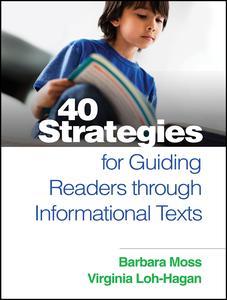40 Strategies for Guiding Readers through Informational Texts
Auteurs : Moss Barbara, Loh-Hagan Virginia

Gaining the skills to critically read a wide variety of informational texts is more important than ever for today's K-12 students. This carefully crafted book offers 40 standards-based instructional activities that teachers can immediately put to use in the classroom. Clear rationales and step-by-step instructions are provided for implementing each strategy, together with helpful classroom examples and suggested texts for different grade levels. In a large-size format for easy photocopying, the book includes 44 reproducible worksheets. Purchasers get access to a Web page where they can download and print the reproducible materials. (Prior edition title: 35 Strategies for Guiding Readers through Informational Texts.)
New to This Edition
*Now features more strategies, including 16 that are completely new.
*Explicit links throughout to the Common Core State Standards (CCSS) and other current standards.
*Two additional strands of activities: Reading Closely and Discussion.
*Numerous new and revised reproducible tools--all downloadable.
Introduction
I. Getting Started Strategies
Strategy 1. Planning a Lesson with Informational Text
Strategy 2. Understanding and Evaluating Informational Texts
Strategy 3. Assessing Text Complexity
Strategy 4. Shared Reading and Text Feature Search
II. Building Background Strategies
Strategy 5. Anticipation Guide
Strategy 6. KWHL: K = (What I Know), W = (What I Want to Know). H = (How I Will Find Out), L = (What I Learned)
Strategy 7. KLEW: K = (What I Know), L = (What I Learned), E = (What Evidence Do I Have for My Learning?), W = (What Additional Questions or Wonderings Do I Have?)
Strategy 8. Table of Contents Prediction
Strategy 9. Imagine, Elaborate, Predict, and Confirm
III. Vocabulary Strategies
Strategy 10. Word Map
Strategy 11. SLAP: S = (Say the word and write it here.), L = (Look for context clues. List them here.), A = (Ask myself what it means and write it here.), P = (Put the synonym in the sentence and write it here. Does it make sense? If not, start over with steps 3 and 4.)
Strategy 12. Root Wheel
Strategy 13. List–Group–Label
Strategy 14. Word Sort
Strategy 15. Semantic Feature Analysis
IV. Reading Closely Strategies
Strategy 16. Close Reading
Strategy 17. Close Thinking
Strategy 18. Text Annotation
Strategy 19. Text Dependent Questions
Strategy 20. Thinking Aloud
Strategy 21. Sticky Notes Bookmark
V. Comprehension Strategies
Strategy 22. Study Guide
Strategy 23. Four Box Comment Card
Strategy 24. I Chart
Strategy 25. CAATS: Creator, Assumptions, Audience/User, Time and Place, Significance
Strategy 26. Text Structures
Strategy 27. Interactive Notebook
VI. Discussion Strategies
Strategy 28. Discussion Web
Strategy 29. 4–3–2–1 Discussion
Strategy 30. Intra Act
Strategy 31. Talking Points
Strategy 32. Three Step Interview
Strategy 33. 3 Minute Pause
VII. Writing Strategies
Strategy 34. Readers' Theatre
Strategy 35. Paragraph Writing Frames
Strategy 36. I Used to Think . . . but Now I Know . . .
Strategy 37. Summary Writing
Strategy 38. CLIQUES: CL, Claim; I, Introduction of Quotation; QU, Quotation; E, Explanation of Quotation; S, So What?
Strategy 39. EPIC: E, Evidence; P, Patterns; I, Inquiry; C, Claims
Strategy 40. Two Column Journal
Appendix. Recommended Materials
Barbara Moss, PhD, is Professor of Literacy Education in the School of Teacher Education at San Diego State University. She has taught English and language arts in elementary, middle, and high school settings and has worked as a reading coach. Dr. Moss’s research focuses on the teaching of informational texts at the elementary and secondary levels. She regularly presents at local, state, national, and international conferences and has published numerous journal articles, columns, book chapters, and books. Dr. Moss has served as the Young Adult Literature column editor for Voices in the Middle, a publication of the National Council of Teachers of English.
Virginia Loh-Hagan, EdD, is a full-time Lecturer in the School of Teacher Education at San Diego State University, where she is in charge of two teaching credential programs. She is also a curriculum designer, educational consultant, and former K-8 teacher. The author of several academic publications and more than 70 children’s books, Dr. Loh-Hagan serves on several children’s book award committees and is cover editor and columnist for The California Reader, a peer-reviewed journal of the California Reading Association. She is a frequent presenter at state and national conferences.
Date de parution : 07-2016
20.3x26.7 cm



